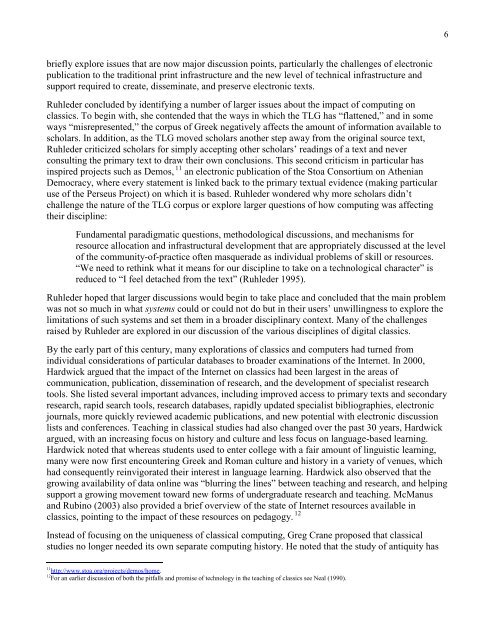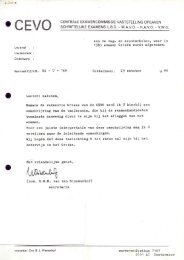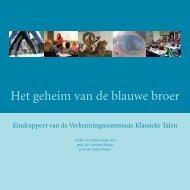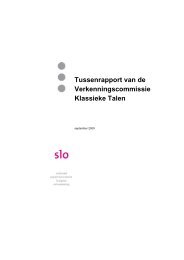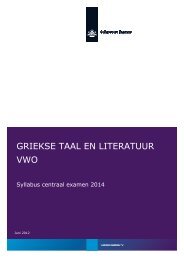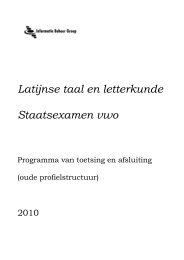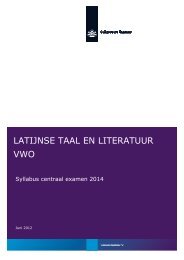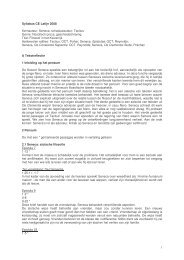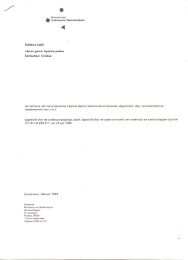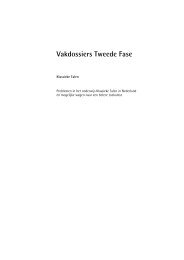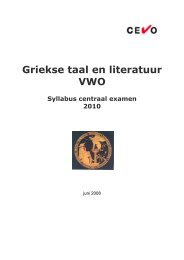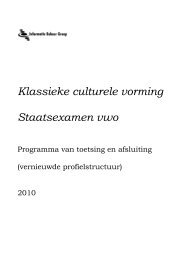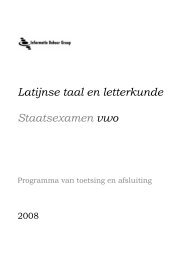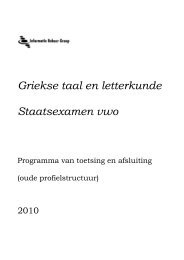Rome Wasn't Digitized in a Day - Council on Library and Information ...
Rome Wasn't Digitized in a Day - Council on Library and Information ...
Rome Wasn't Digitized in a Day - Council on Library and Information ...
Create successful ePaper yourself
Turn your PDF publications into a flip-book with our unique Google optimized e-Paper software.
6<br />
briefly explore issues that are now major discussi<strong>on</strong> po<str<strong>on</strong>g>in</str<strong>on</strong>g>ts, particularly the challenges of electr<strong>on</strong>ic<br />
publicati<strong>on</strong> to the traditi<strong>on</strong>al pr<str<strong>on</strong>g>in</str<strong>on</strong>g>t <str<strong>on</strong>g>in</str<strong>on</strong>g>frastructure <strong>and</strong> the new level of technical <str<strong>on</strong>g>in</str<strong>on</strong>g>frastructure <strong>and</strong><br />
support required to create, dissem<str<strong>on</strong>g>in</str<strong>on</strong>g>ate, <strong>and</strong> preserve electr<strong>on</strong>ic texts.<br />
Ruhleder c<strong>on</strong>cluded by identify<str<strong>on</strong>g>in</str<strong>on</strong>g>g a number of larger issues about the impact of comput<str<strong>on</strong>g>in</str<strong>on</strong>g>g <strong>on</strong><br />
classics. To beg<str<strong>on</strong>g>in</str<strong>on</strong>g> with, she c<strong>on</strong>tended that the ways <str<strong>on</strong>g>in</str<strong>on</strong>g> which the TLG has “flattened,” <strong>and</strong> <str<strong>on</strong>g>in</str<strong>on</strong>g> some<br />
ways “misrepresented,” the corpus of Greek negatively affects the amount of <str<strong>on</strong>g>in</str<strong>on</strong>g>formati<strong>on</strong> available to<br />
scholars. In additi<strong>on</strong>, as the TLG moved scholars another step away from the orig<str<strong>on</strong>g>in</str<strong>on</strong>g>al source text,<br />
Ruhleder criticized scholars for simply accept<str<strong>on</strong>g>in</str<strong>on</strong>g>g other scholars’ read<str<strong>on</strong>g>in</str<strong>on</strong>g>gs of a text <strong>and</strong> never<br />
c<strong>on</strong>sult<str<strong>on</strong>g>in</str<strong>on</strong>g>g the primary text to draw their own c<strong>on</strong>clusi<strong>on</strong>s. This sec<strong>on</strong>d criticism <str<strong>on</strong>g>in</str<strong>on</strong>g> particular has<br />
<str<strong>on</strong>g>in</str<strong>on</strong>g>spired projects such as Demos, 11 an electr<strong>on</strong>ic publicati<strong>on</strong> of the Stoa C<strong>on</strong>sortium <strong>on</strong> Athenian<br />
Democracy, where every statement is l<str<strong>on</strong>g>in</str<strong>on</strong>g>ked back to the primary textual evidence (mak<str<strong>on</strong>g>in</str<strong>on</strong>g>g particular<br />
use of the Perseus Project) <strong>on</strong> which it is based. Ruhleder w<strong>on</strong>dered why more scholars didn’t<br />
challenge the nature of the TLG corpus or explore larger questi<strong>on</strong>s of how comput<str<strong>on</strong>g>in</str<strong>on</strong>g>g was affect<str<strong>on</strong>g>in</str<strong>on</strong>g>g<br />
their discipl<str<strong>on</strong>g>in</str<strong>on</strong>g>e:<br />
Fundamental paradigmatic questi<strong>on</strong>s, methodological discussi<strong>on</strong>s, <strong>and</strong> mechanisms for<br />
resource allocati<strong>on</strong> <strong>and</strong> <str<strong>on</strong>g>in</str<strong>on</strong>g>frastructural development that are appropriately discussed at the level<br />
of the community-of-practice often masquerade as <str<strong>on</strong>g>in</str<strong>on</strong>g>dividual problems of skill or resources.<br />
“We need to reth<str<strong>on</strong>g>in</str<strong>on</strong>g>k what it means for our discipl<str<strong>on</strong>g>in</str<strong>on</strong>g>e to take <strong>on</strong> a technological character” is<br />
reduced to “I feel detached from the text” (Ruhleder 1995).<br />
Ruhleder hoped that larger discussi<strong>on</strong>s would beg<str<strong>on</strong>g>in</str<strong>on</strong>g> to take place <strong>and</strong> c<strong>on</strong>cluded that the ma<str<strong>on</strong>g>in</str<strong>on</strong>g> problem<br />
was not so much <str<strong>on</strong>g>in</str<strong>on</strong>g> what systems could or could not do but <str<strong>on</strong>g>in</str<strong>on</strong>g> their users’ unwill<str<strong>on</strong>g>in</str<strong>on</strong>g>gness to explore the<br />
limitati<strong>on</strong>s of such systems <strong>and</strong> set them <str<strong>on</strong>g>in</str<strong>on</strong>g> a broader discipl<str<strong>on</strong>g>in</str<strong>on</strong>g>ary c<strong>on</strong>text. Many of the challenges<br />
raised by Ruhleder are explored <str<strong>on</strong>g>in</str<strong>on</strong>g> our discussi<strong>on</strong> of the various discipl<str<strong>on</strong>g>in</str<strong>on</strong>g>es of digital classics.<br />
By the early part of this century, many explorati<strong>on</strong>s of classics <strong>and</strong> computers had turned from<br />
<str<strong>on</strong>g>in</str<strong>on</strong>g>dividual c<strong>on</strong>siderati<strong>on</strong>s of particular databases to broader exam<str<strong>on</strong>g>in</str<strong>on</strong>g>ati<strong>on</strong>s of the Internet. In 2000,<br />
Hardwick argued that the impact of the Internet <strong>on</strong> classics had been largest <str<strong>on</strong>g>in</str<strong>on</strong>g> the areas of<br />
communicati<strong>on</strong>, publicati<strong>on</strong>, dissem<str<strong>on</strong>g>in</str<strong>on</strong>g>ati<strong>on</strong> of research, <strong>and</strong> the development of specialist research<br />
tools. She listed several important advances, <str<strong>on</strong>g>in</str<strong>on</strong>g>clud<str<strong>on</strong>g>in</str<strong>on</strong>g>g improved access to primary texts <strong>and</strong> sec<strong>on</strong>dary<br />
research, rapid search tools, research databases, rapidly updated specialist bibliographies, electr<strong>on</strong>ic<br />
journals, more quickly reviewed academic publicati<strong>on</strong>s, <strong>and</strong> new potential with electr<strong>on</strong>ic discussi<strong>on</strong><br />
lists <strong>and</strong> c<strong>on</strong>ferences. Teach<str<strong>on</strong>g>in</str<strong>on</strong>g>g <str<strong>on</strong>g>in</str<strong>on</strong>g> classical studies had also changed over the past 30 years, Hardwick<br />
argued, with an <str<strong>on</strong>g>in</str<strong>on</strong>g>creas<str<strong>on</strong>g>in</str<strong>on</strong>g>g focus <strong>on</strong> history <strong>and</strong> culture <strong>and</strong> less focus <strong>on</strong> language-based learn<str<strong>on</strong>g>in</str<strong>on</strong>g>g.<br />
Hardwick noted that whereas students used to enter college with a fair amount of l<str<strong>on</strong>g>in</str<strong>on</strong>g>guistic learn<str<strong>on</strong>g>in</str<strong>on</strong>g>g,<br />
many were now first encounter<str<strong>on</strong>g>in</str<strong>on</strong>g>g Greek <strong>and</strong> Roman culture <strong>and</strong> history <str<strong>on</strong>g>in</str<strong>on</strong>g> a variety of venues, which<br />
had c<strong>on</strong>sequently re<str<strong>on</strong>g>in</str<strong>on</strong>g>vigorated their <str<strong>on</strong>g>in</str<strong>on</strong>g>terest <str<strong>on</strong>g>in</str<strong>on</strong>g> language learn<str<strong>on</strong>g>in</str<strong>on</strong>g>g. Hardwick also observed that the<br />
grow<str<strong>on</strong>g>in</str<strong>on</strong>g>g availability of data <strong>on</strong>l<str<strong>on</strong>g>in</str<strong>on</strong>g>e was “blurr<str<strong>on</strong>g>in</str<strong>on</strong>g>g the l<str<strong>on</strong>g>in</str<strong>on</strong>g>es” between teach<str<strong>on</strong>g>in</str<strong>on</strong>g>g <strong>and</strong> research, <strong>and</strong> help<str<strong>on</strong>g>in</str<strong>on</strong>g>g<br />
support a grow<str<strong>on</strong>g>in</str<strong>on</strong>g>g movement toward new forms of undergraduate research <strong>and</strong> teach<str<strong>on</strong>g>in</str<strong>on</strong>g>g. McManus<br />
<strong>and</strong> Rub<str<strong>on</strong>g>in</str<strong>on</strong>g>o (2003) also provided a brief overview of the state of Internet resources available <str<strong>on</strong>g>in</str<strong>on</strong>g><br />
classics, po<str<strong>on</strong>g>in</str<strong>on</strong>g>t<str<strong>on</strong>g>in</str<strong>on</strong>g>g to the impact of these resources <strong>on</strong> pedagogy. 12<br />
Instead of focus<str<strong>on</strong>g>in</str<strong>on</strong>g>g <strong>on</strong> the uniqueness of classical comput<str<strong>on</strong>g>in</str<strong>on</strong>g>g, Greg Crane proposed that classical<br />
studies no l<strong>on</strong>ger needed its own separate comput<str<strong>on</strong>g>in</str<strong>on</strong>g>g history. He noted that the study of antiquity has<br />
11 http://www.stoa.org/projects/demos/home.<br />
12 For an earlier discussi<strong>on</strong> of both the pitfalls <strong>and</strong> promise of technology <str<strong>on</strong>g>in</str<strong>on</strong>g> the teach<str<strong>on</strong>g>in</str<strong>on</strong>g>g of classics see Neal (1990).


